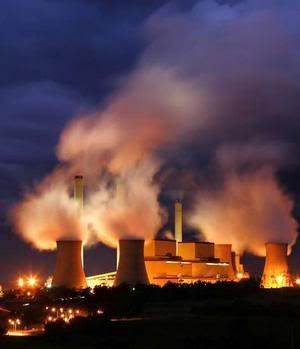Kudos To U.S. MSM On Climate Report Coverage?
 Yes, it's true. An award-winning climate scientist says the U.S. media wasn't all that hysterical in its coverage of the recent UN's IPCC report (actually, the non-scientific executive summary of a pending scientific report) on global warming. Media in the UK, however, were a very different story.
Yes, it's true. An award-winning climate scientist says the U.S. media wasn't all that hysterical in its coverage of the recent UN's IPCC report (actually, the non-scientific executive summary of a pending scientific report) on global warming. Media in the UK, however, were a very different story.Mike Hulme, of the School of Environmental Sciences, University of East Anglia and winner of the 1995 Hugh Robert Mill Prize of the Royal Meteorological Society, wrote to Nature Magazine:
Communicating science to wider, public audiences, however - in this case on matters of important public policy - is an art that requires careful message management and tone setting. It seems that confident and salient science, as presented by the IPCC, may be received by the public in non-productive ways, depending on the intervening media. With this in mind, I examined the coverage of the IPCC report in the ten main national UK newspapers for Saturday 3 February, the day after the report was released.Hulme is conveniently overlooking some over-amped US coverage, particularly on the broadcast networks, but his point is well taken. The European media, because they brand themselves as "conservative" or "liberal" quite openly, are unfettered by the U.S. media's on-going futile efforts to appear objective.
Only one newspaper failed to run at least one story on the report (one newspaper ran seven stories), but what was most striking was the tone. The four UK 'quality' newspapers all ran front-page headlines conveying a message of rising anxiety: "Final warning", "Worse than we thought", "New fears on climate raise heat on leaders" and "Only man can stop climate disaster". And all nine newspapers introduced one or more of the adjectives "catastrophic", "shocking", "terrifying" or "devastating" in their various qualifications of climate change.
Yet none of these words exist in the report, nor were they used in the scientists' presentations in Paris. Added to the front-page vocabulary of "final", "fears", "worse" and "disaster", they offer an insight into the likely response of the 20 million Britons who read these newspapers.
In contrast, an online search of some leading newspapers in the United States suggests a different media discourse. Thus, on the same day, one finds these headlines: "UN climate panel says warming is man-made", "New tack on global warming", "Warming report builds support for action" and "The basics: ever firmer statements on global warming". This suggests a more neutral representation in the United States of the IPCC's key message, and a tone that facilitates a less loaded or frenzied debate about options for action.
Hulme, like all good scientists, went beyond mere observation to state a theory:
Campaigners, media and some scientists seem to be appealing to fear in order to generate a sense of urgency. If they want to engage the public in responding to climate change, this is unreliable at best and counter-productive at worst. As Susanne Moser and Lisa Dilling point out in Creating a Climate for Change: Communicating Climate Change and Facilitating Social Change (Cambridge Univ. Press, 2007), such appeals often lead to denial, paralysis, apathy or even perverse reactive behaviour.Unfortunately, they also lead to acceptance of half-baked, unproductive and expensive schemes to force global warming solutions on a skeptical public. And that, of course, is what the media wants: Big new programs to cover, and later turn on as they become, as they unevitably will, massive sinkholes of waste, corruption and do-nothingness.
hat-tip: Greenie Watch
Labels: Climate change, Global warming




<< Home